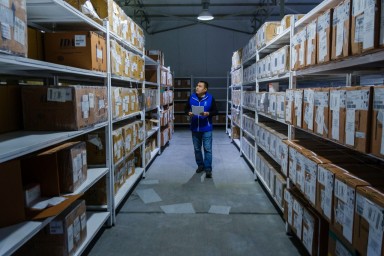Behind the scenes: Working in a warehouse for HIV and TB programs
Islam works at the UNDP warehouse, where all equipment, medical devices, medicines and tests purchased with funds from the Global Fund are stored.
A typical working day in Islam is far from ordinary. When he comes to his "office" in the morning, he starts by checking the temperature and humidity; in fact, hundreds of lives literally depend on it. Islam works at the UNDP warehouse, where all equipment, medical devices, medicines and tests purchased with funds from the Global Fund are stored. Islam and his colleague Erkin are responsible for their safe storage and timely delivery so that everyone in need receives the highest quality treatment.
"My job is to take the cargo to the warehouse when it gets to us after customs, inspect it upon receipt for integrity, quantity, check the temperature regime that was maintained during transportation, and make sure there are no defects. After that, I find a place to store it and register all the data (expiration date, serial number, etc.) in our system together with my colleague. We keep stock records and inventory. Then we inform the project and partners that the product has been received, and they decide how to distribute it. As soon as we receive their instructions, we ship the cargo accordingly. I also have to keep the warehouse clean, monitor the storage conditions and optimize the space," explains Islam, who has been working here for six years.
Logistics is a key part of the project
As part of a grant from the Global Fund, UNDP supports national programs to combat tuberculosis and HIV in order to provide the highest quality prevention, diagnosis, treatment and care to those in need. This includes the purchase of a large number of medicines and equipment, which are stored in a warehouse with an area of 780 km2 in the caring hands of Islam and Erkin. It is extremely important that the storage conditions are constantly monitored so that medicines, tests and other materials do not lose their effectiveness.
"Of course, we work together with the project specialists. But we, in turn, must promptly arrange delivery. If some kind of malfunction occurs in our work, it means that the patient will not receive medications on time, will not receive treatment, complications may arise. There will also be consequences if there are storage problems. Tests may not show correct results, or tainted medications may cause side effects. Warehouse and transport logistics are a very important part of our project," Islam says, recording the temperature once again.
The temperature in the warehouse is always maintained from 15 to 25C, humidity is not higher than 50%. Medicines and tests requiring special storage conditions are stored in special refrigerators. Islam also makes sure that nothing is stored at a height of more than 2.5 m, as the temperature rises with altitude. The warehouse is equipped with round-the-clock security, video surveillance, fire alarm and generators in case of a power outage. The warehouse is used to store a wide range of goods necessary for programs to combat tuberculosis, HIV and COVID-19, including medicines, injections, tests and reagents, personal protective equipment, laboratory equipment, equipment, preventive materials and food packages for vulnerable groups of the population.
Working in a warehouse can be quite hard and tedious, but day to day is not necessary. "Usually everything goes according to plan: at the beginning of the month, leftovers are sent to warehouses, how much is left. Software specialists study them, and make up orders. But it happens that there are patients who unexpectedly come to the organization and urgently need treatment, and we need to arrange urgent delivery. Sometimes we also get very large and heavy loads, and we have to work overtime to find a way to deal with it," Islam explains. Islam recently helped deliver a CT scan to the National Infectious Diseases Hospital. The heaviest part weighed more than 2 tons.
Islam understands that a lot depends on his seemingly invisible but irreplaceable work. "I am proud to be a part of this humanitarian organization," Islam says. "There are people who really need our help, and as a small link in the chain, I can help someone get timely treatment."
